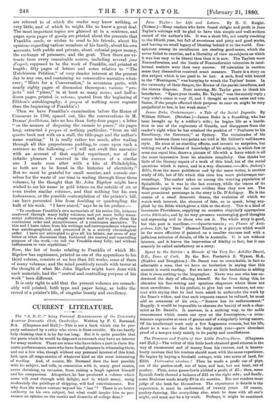James Duke, Costermonger : a Tale of the Social Deposits.
By William Gilbert. (Strahan.)—James Duke is a foundling, who has been brought up by a soldier's wife ; he begins life as a bands- man in one of the regiments of Guards, and disappears from the reader's sight when he has attained the position of "Poulterer to his Excellency, the Governor," at Sydney. The vicissitudes of his career between these two points are told in Mr. Gilbert's well-known- style. He aims at no startling effects, and invents no surprises, but writing out of a fullness of knowledge of his subject, in which few or none can equal him, draws a picture of life with a force which is all the more impressive from its absolute simplicity. One thinks but little of the literary aspect of a work of this kind, but of the social questions which it raises, and in a way discusses.—Mrs. Dubosg's Bible, from the same publishers and by the same writer, is another study of life, but of life which this time has more picturesque sur- roundings. The author takes us among the weaving population of Spitalfields, as it was in the last century, while the traces of its Huguenot origin were far more evident than they now are. The most prominent personage in the story is Dr. D'Aubigny. He is the centre of a small domestic drama, the evolution of which we- watch with interest, the element of fate, so to speak, being sup- plied by the Bible which gives a title to the story. This is a kind of inanimate Providence, supplying on occasion singularly appropriate sortes Biblicales, and by its very presence encouraging good thoughts and repressing evil in those who see it. The whole story is good, but this part is excellent.—Sguatterniania ; or, Phases of Anti- podean Life, by " Erro " (Samuel Tinsley), is a picture which would be far more effective if painted on a smaller canvass and with a judicious selection of details, of life in Australia. It is not without interest, and it leaves the impression of fidelity to fact, but it can scarcely be called satisfactory as a story.


































 Previous page
Previous page